Mouthwashes
Mouthwashes
Mouthwashes
Your dentist or dental hygienist has advised you to use a mouthwash. For example, you have a number of starting cavities (caries). Brushing your teeth doesn't work very well. Or, for example, you suffer from bleeding gums or have just undergone a gum treatment. Of course you can also consider using a mouthwash yourself. Many varieties are available at pharmacies, drugstores and supermarkets. The different flushing agents have a different effect. The dentist or dental hygienist will advise you which one is best to use.
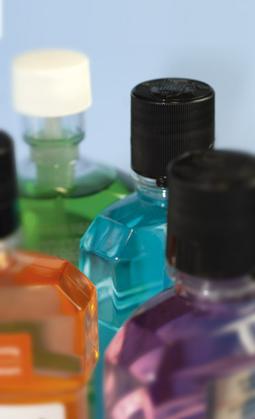
Flushing, for whom and why?
Our daily oral hygiene consists of brushing our teeth for two minutes twice a day with a fluoride toothpaste. In addition, your dentist or dental hygienist may recommend that you clean the spaces between your teeth and/or rinse your mouth with a mouthwash. For example, those who wear braces or have too little saliva in their mouth run an increased risk of getting cavities (caries). Then brushing your teeth twice a day with fluoride toothpaste is not enough. Your practitioner may then advise you to use a mouthwash with fluoride. After extensive gum treatment, your practitioner may temporarily recommend a rinsing agent containing chlorhexidine. If you want to keep your mouth healthy and maintain the condition of your gums or appreciate a fresh taste in your mouth, you can rinse your mouth with mouthwash after brushing your teeth. Those who use mouthwashes also continue to brush their teeth twice a day.
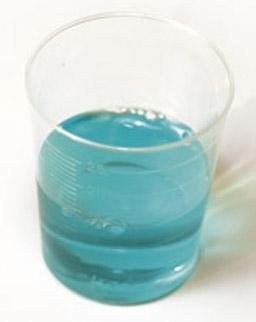
Anti-cavity mouthwashes
Fluoride mouthwashes strengthen tooth enamel. Dentists and dental hygienists mainly recommend them to patients with an increased risk of cavities. Those who may need (temporarily) extra fluoride are, for example, children or adults with fixed braces, patients with abnormalities in the enamel structure or with incipient cavities. A fluoride rinse is also recommended for patients with sensitive teeth (when the gums have receded) and to prevent cavities in the tooth root (root caries). The rinsing agent is available at the pharmacy, drugstore or supermarket. Anyone who has to use a fluoride flushing agent temporarily, should be checked by his practitioner whether he should continue with it or whether he can stop using it. Some examples are Listerine Strong Denture, Listerine Total Care, Elmex anti-caries mouthwash, ACT, Desensin. Drugstores and supermarkets also sell products under their own brand name.
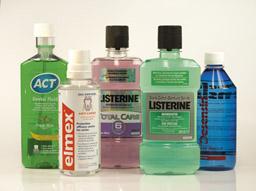
Mouthwashes against inflammation and infections
Mouthwashes containing chlorhexidine prevent the formation of dental plaque. You can generally use these flushing agents for a short time (usually 1 to 2 weeks). Its use can cause discoloration of your teeth and tongue, a bad taste and a burning sensation of the mucous membranes. Chlorhexidine rinse aids can be prescribed by your practitioner after gum treatment or acute gingivitis. In addition, a hydrogen peroxide rinse can be advised to prevent discolouration of the teeth and tongue. Chlorhexidine is also used to prevent mouth infections after oral surgery. For patients who cannot spit out or rinse, or patients who only need to apply the rinse in a single area, it is best to use a chlorhexidine spray or gel. If you are considering using a chlorhexidine rinse without a prescription, talk to your dentist or dental hygienist. Some examples are PerioAid and Corsodyl.
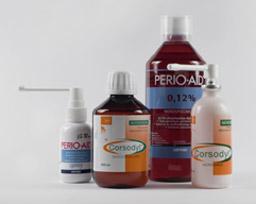
Mouthwashes against dental plaque
Mouthwashes with antibacterial properties can contribute to good oral hygiene. This type of rinse aid can help reduce plaque buildup and improve gum health. These mouthwashes are also often used for fresh breath. Anyone who thinks that you can use mouthwashes and then no longer have to brush is wrong. These mouthwashes are also used as a supplement to daily oral care. Rinsing is not a substitute for brushing your teeth! Some examples are Meridol, Listerine Coolmint and Cool Citrus.
Mouthwashes for bad breath
Bad breath is often caused by bacteria on the back of the tongue. They produce sulfur compounds and that smells unpleasant. You can scrape these bacteria off twice a day with a tongue cleaner. Does that not work enough? Then you can also kill the bacteria that cause bad breath with a gargle and / or a mouth spray. Examples are Halita and Meridol Halitoses.
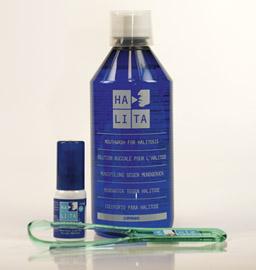
Mouthwashes against dental erosion
Dental erosion is the dissolution of the tooth enamel by the action of acids from food and drink or from the stomach. To prevent dental erosion, it is important not to eat or drink more than seven times a day and to brush your teeth twice with a fluoride toothpaste. In addition, dentists and dental hygienists advise not to consume acidic products one hour before brushing your teeth. You can also rinse your mouth with a mouthwash to protect your teeth against dental erosion. An example is Elmex Erosion Protection.
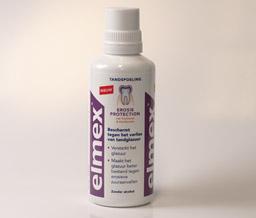
Mouthwashes for a dry mouth
A dry mouth is caused by a lack of saliva. For example, the salivary glands produce too little saliva or stop working altogether. Many medications have a dry mouth as a side effect. Diseases and radiation can also cause a dry mouth. If your salivary glands stop working, it is not possible to stimulate saliva production. If they still work a little, it is often insufficient. So-called saliva substitutes may offer a solution. These are special moisturizing liquids or gels that can give a pleasant mouthfeel. Good examples are Biotène mouthwash and Biotène OralBalance.
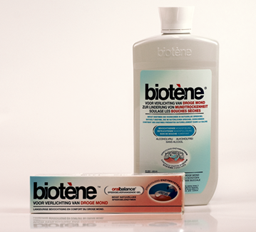
Other mouthwashes
There are many different types of rinse aids available. One works against sensitive teeth and another gives fresh breath. Many products offer excellent results, but their effect has never been scientifically proven. Of course you can check for yourself whether the product works for you, whether you benefit from it or whether you appreciate the taste. Examples are Aquafresh, Sensodyne, Odol and various private brands of drugstores, etc.
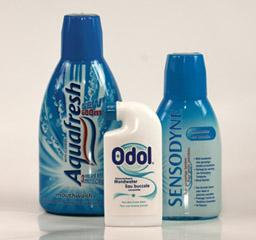
When should I rinse and how often?
When to rinse depends very much on the product you are using. Please refer to the instructions on the packaging or in the leaflet. In it you will also find information with how much mouthwash you should rinse with, how long you should do this and how often. Does your dentist or dental hygienist advise you to use a rinse aid? Then follow that advice.
Myths and facts about flushing agents
Does everyone have to rinse?
No, not everyone needs a mouthwash. You take good care of your teeth by brushing your teeth twice a day with a fluoride toothpaste. On the advice of your practitioner, you can also clean the spaces between your teeth daily with brushes, toothpicks, dental floss or oral irrigator. In addition, your dentist or dental hygienist will indicate whether rinsing is necessary or advisable for you.
Can I improve my oral hygiene by using mouthwashes? And if so how?
As an additional addition to your daily oral hygiene, you can use a mouthwash to help reduce plaque build-up and improve gum health.
Of course you can also use a rinse aid if you like. Your dentist or dental hygienist can advise you. Follow the directions on the manufacturer's packaging.
Can I prevent cavities by using a mouthwash?
You can prevent cavities by brushing your teeth twice a day with a fluoride toothpaste. With the toothbrush you remove the dental plaque from your teeth. With the toothpaste you apply fluoride to your teeth. Fluoride makes the tooth enamel harder and less prone to getting cavities. If you nevertheless develop cavities, it may be advisable to rinse with a fluoride mouthwash. Rinsing the mouth is in addition to brushing your teeth twice a day, but does not replace brushing your teeth.
I use a rinse aid. Can I skip brushing my teeth now?
No! The use of a mouthwash is always in addition to the two daily brushings. Do you have to rinse with water after eating? Which can. By rinsing with water after eating, you wash away the food residue in your mouth. Of course, by rinsing with water you do not apply any substances to protect your teeth.
Can I use a rinse aid for a fresh taste?
Yes, by using rinse aids you get a fresh taste in your mouth. But a fresh taste does not mean that you have fresh breath. The freshening of your mouth can only partially cover up bad breath (halitosis) and usually only for a few minutes.
Do I just have to spit out a rinse aid or do I have to rinse my mouth with water afterwards?
For proper use of the rinse aids, you should read the package leaflet or follow the advice of your dentist or dental hygienist. In general, it is not desirable to rinse with water.
Can I use a mouthwash with alcohol?
Adults can use a mouthwash with alcohol. Adding alcohol to mouthwash is a concern for some because of an alleged relationship to the occurrence of cancer in the mouth. Research has not found any relationship between the use of alcohol-containing mouthwashes and the development of oral cancer. It is up to the user to decide whether or not to use an alcohol-containing mouthwash. Consult with your practitioner if desired.
Do you want to know for sure whether a mouthwash is useful for you? In that case, talk to your dentist or dental hygienist before you start taking the medicine.